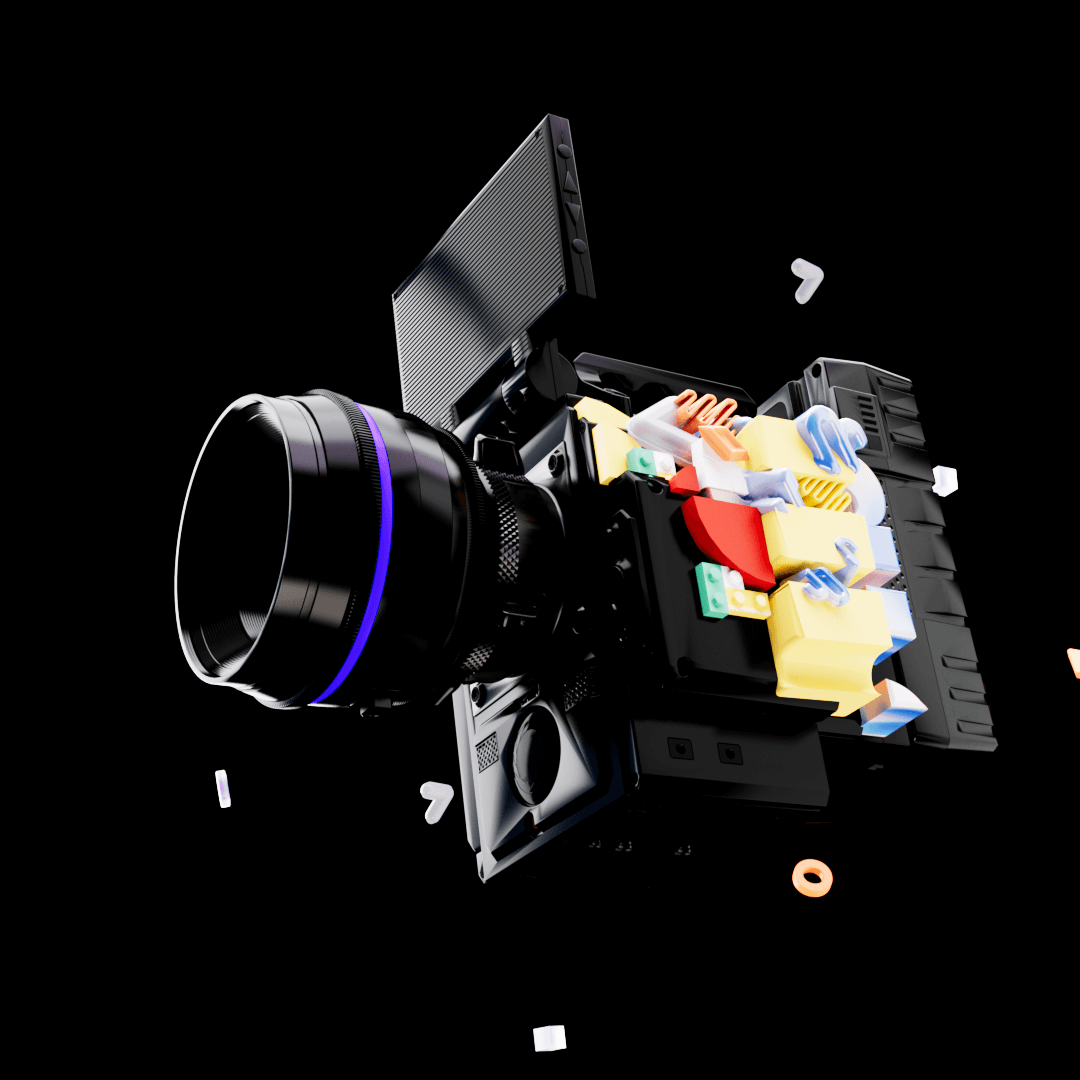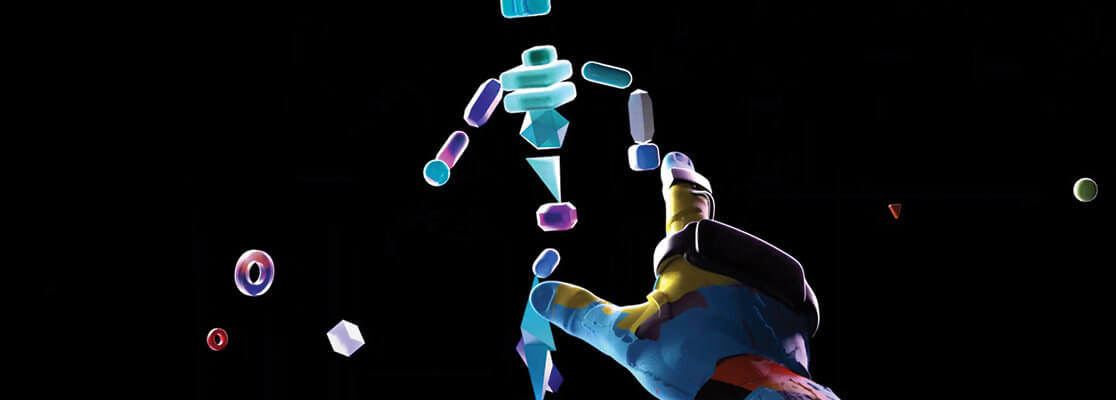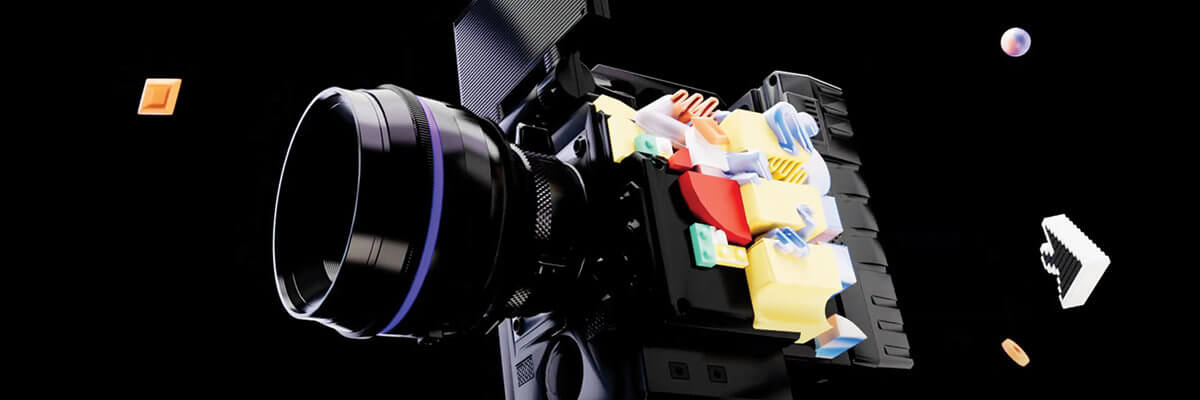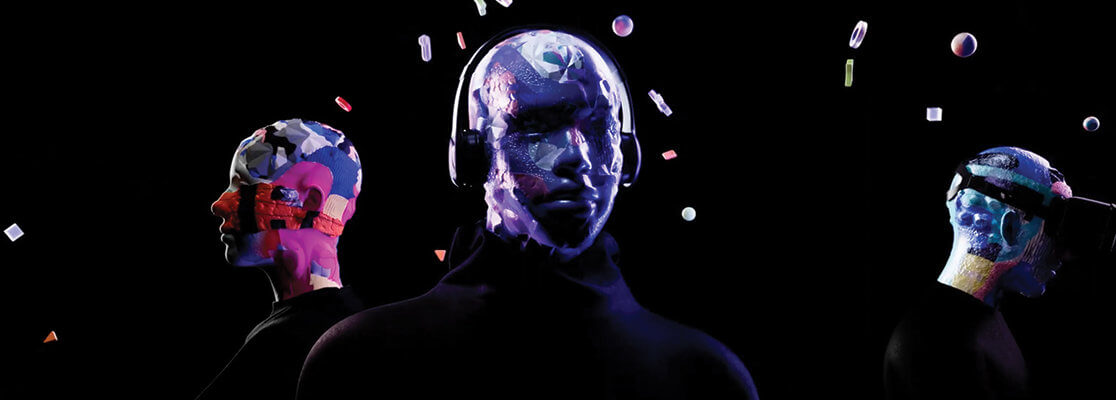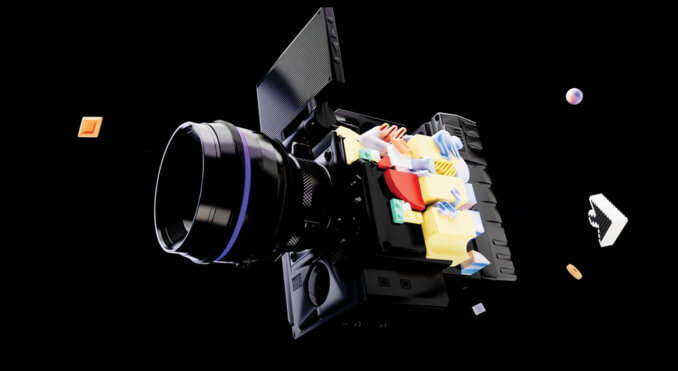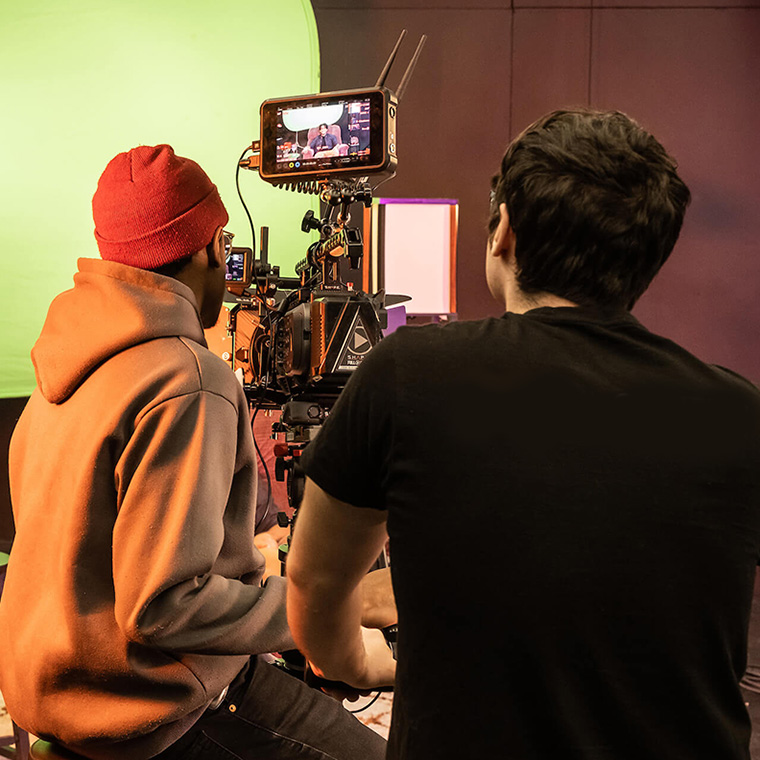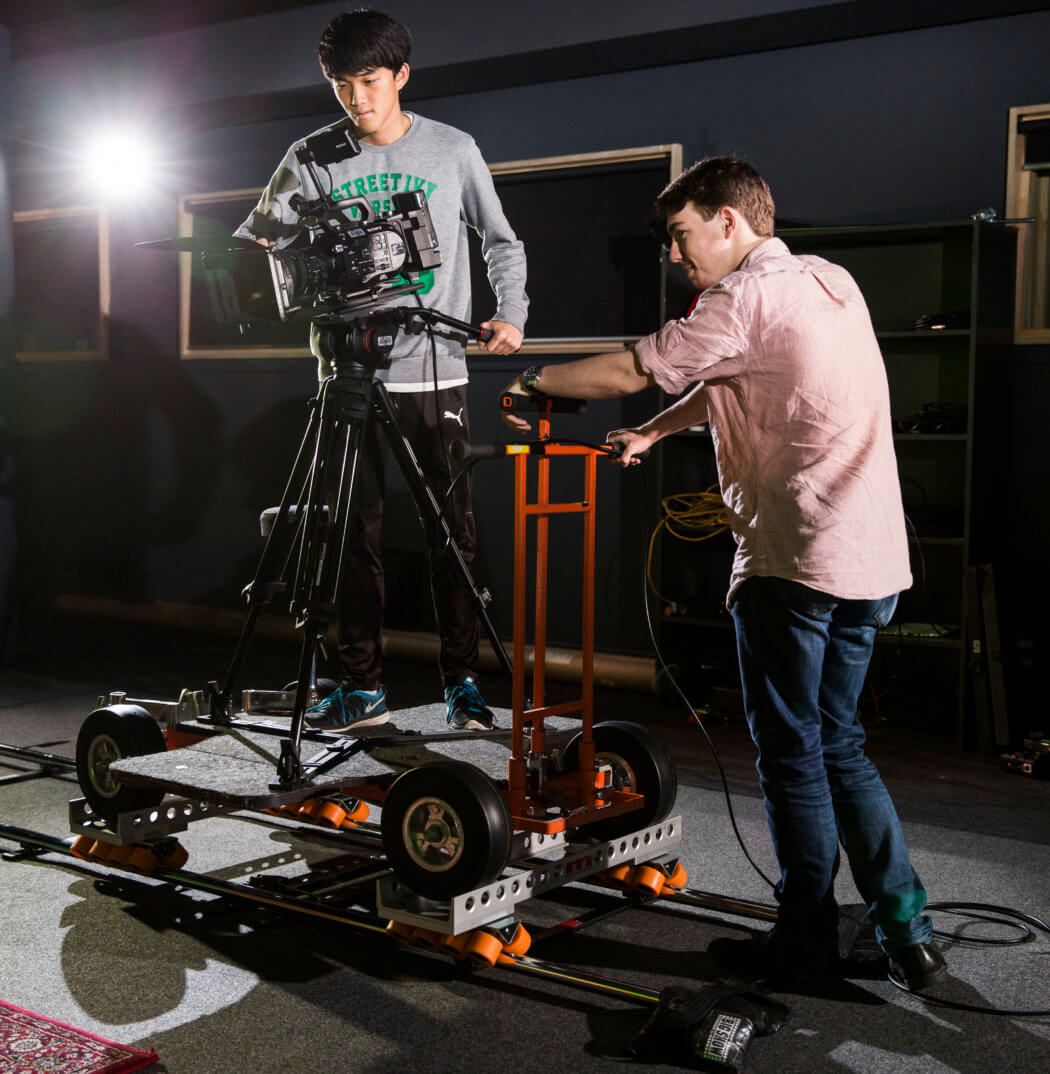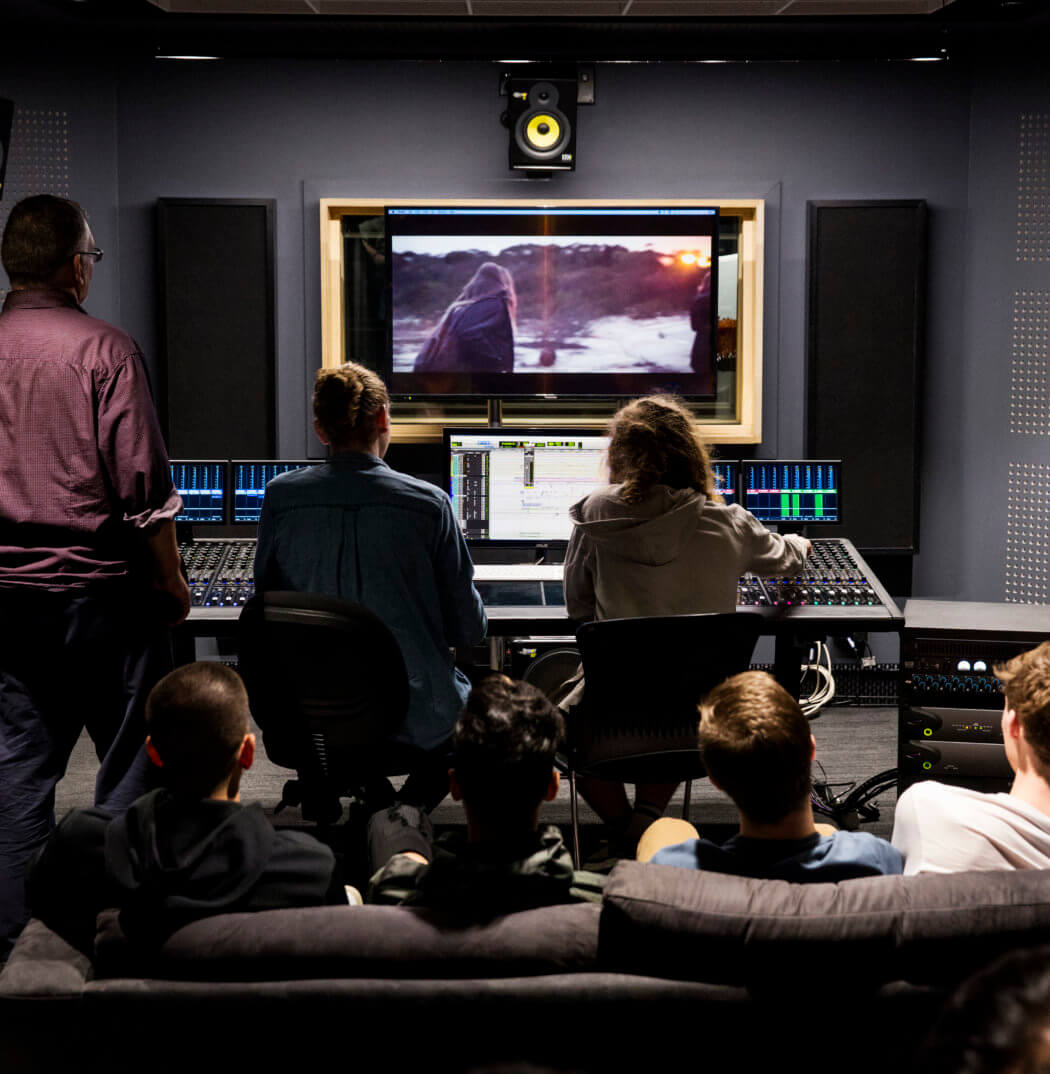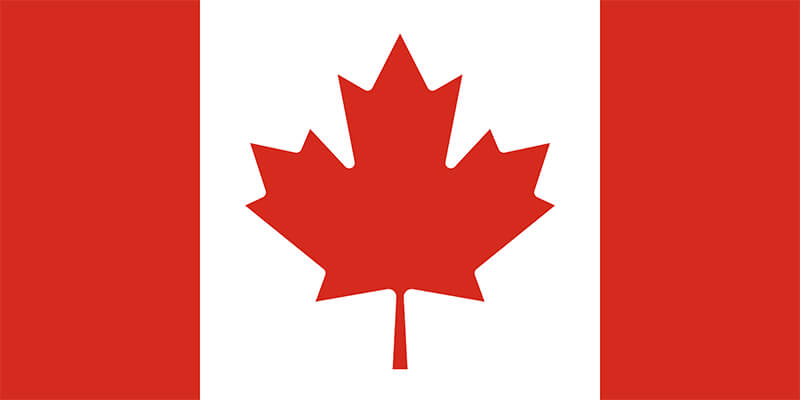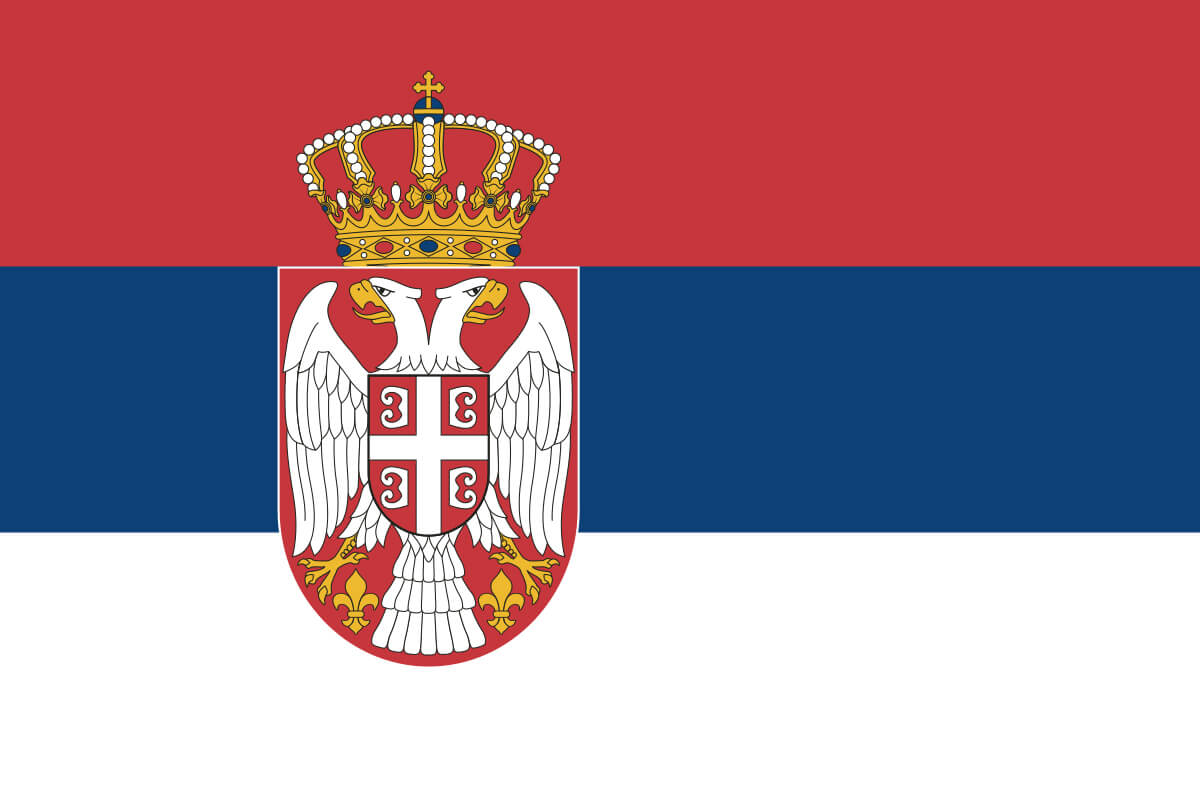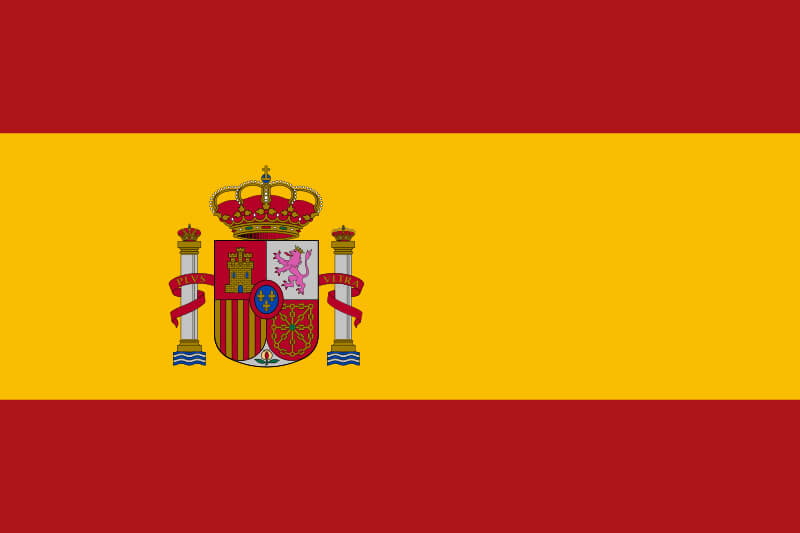Bachelor of Film (Production)
LOOK THROUGH THE LENS TO SEE YOUR FUTURE IN FILM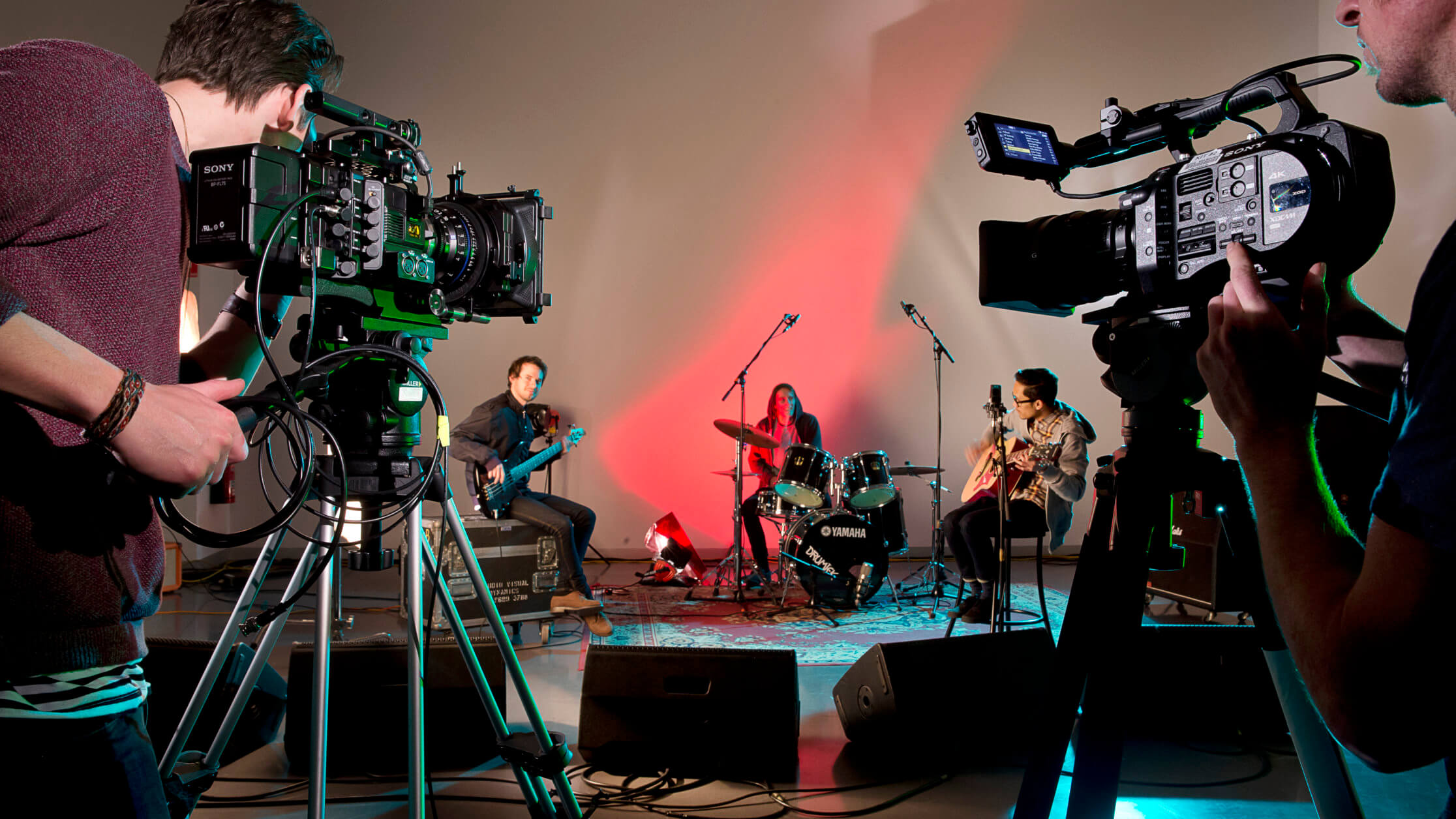
Available at
Dubai
Fees
Bachelor of Film (Production)
Domestic Fees
-
Plan A – Yearly Payment – AED 60,300
-
Plan B – Trimester Payment – AED 21,930
-
Plan C – Monthly Payment – AED 7,790 (9 Payments Per Year)
-
Plan C+ – Monthly Payment – AED 6,022.50 (12 Payments Per Year)
*All fees mentioned above are exclusive of 5% VAT
*Terms and Conditions Apply
Bachelor of Film (Production)
International Fees
-
Plan A – Yearly Payment – AED 60,300
-
Plan B – Trimester Payment – AED 21,930
-
Plan C – Monthly Payment – AED 7,790 (9 Payments Per Year)
-
Plan C+ – Monthly Payment – AED 6,022.50 (12 Payments Per Year)
*All fees mentioned above are exclusive of 5% VAT
*Terms and Conditions Apply
Duration(s)
8 Trimesters Full Time
Complete the program across 3 years (8 trimesters)
Bachelor of Film (Production)
Course Durations
8 Trimesters Full Time
Complete the program across 3 years (8 trimesters)
We understand that things can change, so you'll have the flexibility to change your study load throughout your course if you need to.
Start Date(s)
Dubai
Bachelor of Film (Production)
Start Dates
Dubai
Entry Requirements
Bachelor of Film (Production)
Domestic Entry Requirements
Domestic Entry Requirements
Minimum age requirements
Academic requirements
English language requirements
International English Language Testing System (IELTS): A band score of 6 or higher for a Higher Education (HE) course and 5.5 or higher for a VET course (only the Academic Test is accepted), OR
Test of English as a Foreign Language (TOEFL): A score of 550 or higher (paper based test), 60 or higher (internet based test) for a Higher Education (HE) course and a minimum score of 527 (paper based test) or 46 (internet based test) for a VET course, OR
Bachelor of Film (Production)
International Entry Requirements
International Entry Requirements
Minimum age requirements
Academic requirements
English language requirements
International English Language Testing System (IELTS): A band score of 6 or higher for a Higher Education (HE) course and 5.5 or higher for a VET course (only the Academic Test is accepted), OR
Test of English as a Foreign Language (TOEFL): A score of 550 or higher (paper based test), 60 or higher (internet based test) for a Higher Education (HE) course and a minimum score of 527 (paper based test) or 46 (internet based test) for a VET course, OR
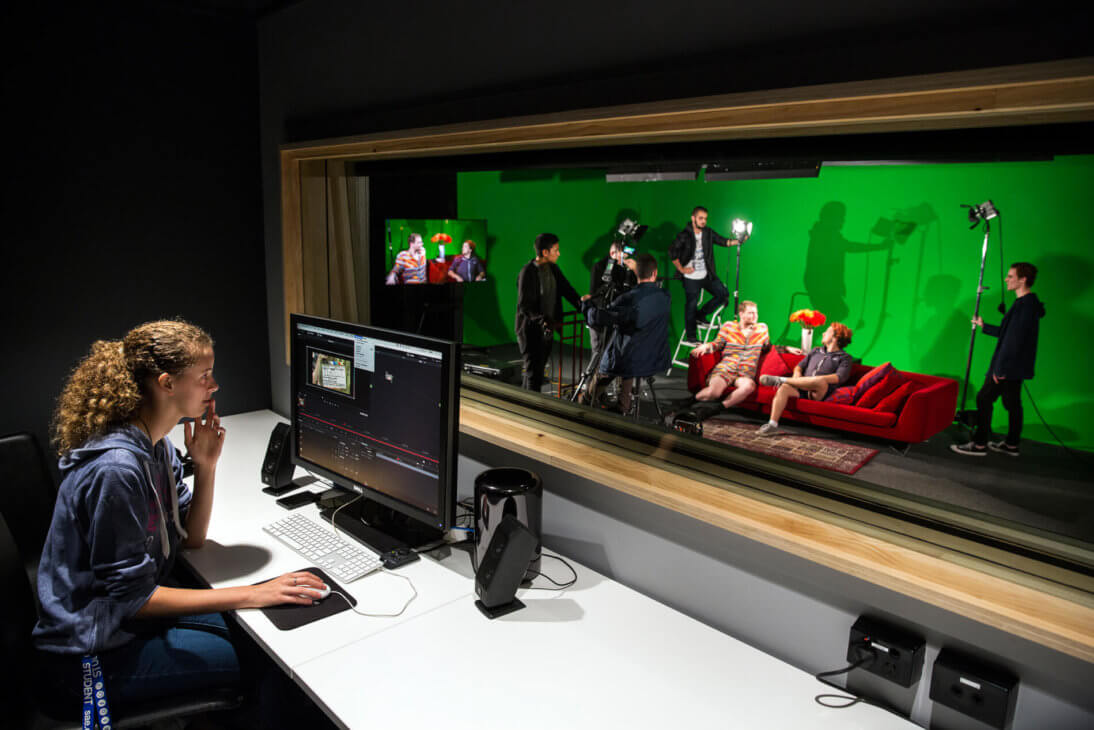
Train in world class studio environments
4K Red, Sony and Canon cameras, DaVinci Resolve colour grading software, Adobe Premiere Pro, and Adobe Creative Cloud.
Practical, immersive training
All work is project-based, with no exams.
Creative collaboration
Collaborate with audio specialists, artists, designers, game developers and animators.
Expand your career
Graduate with a portfolio, work experience, employability and entrepreneurial skills and a network of fellow creatives.
Tools & Software

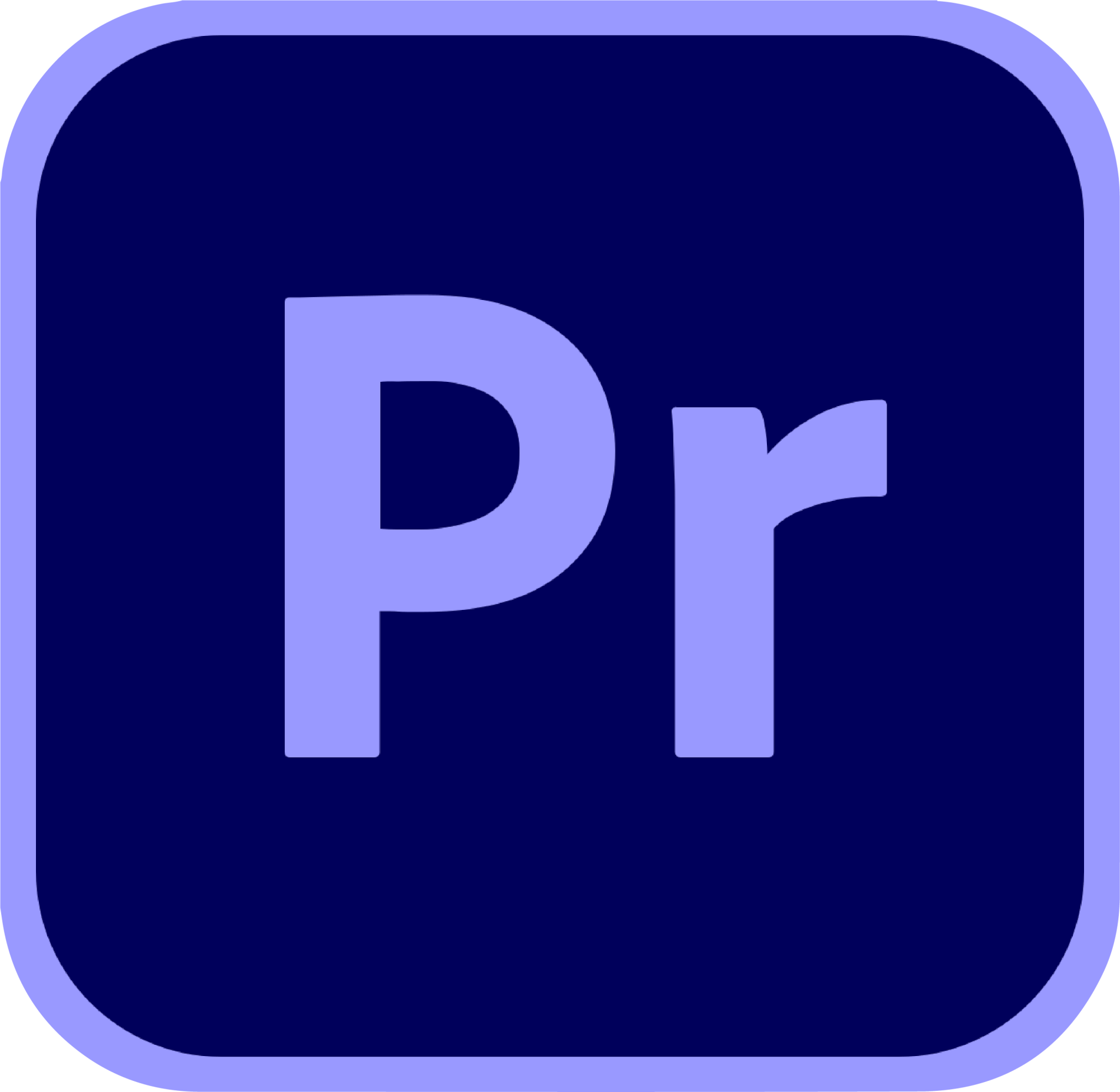

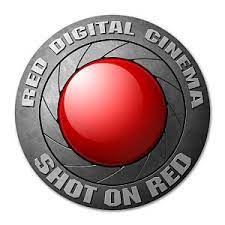
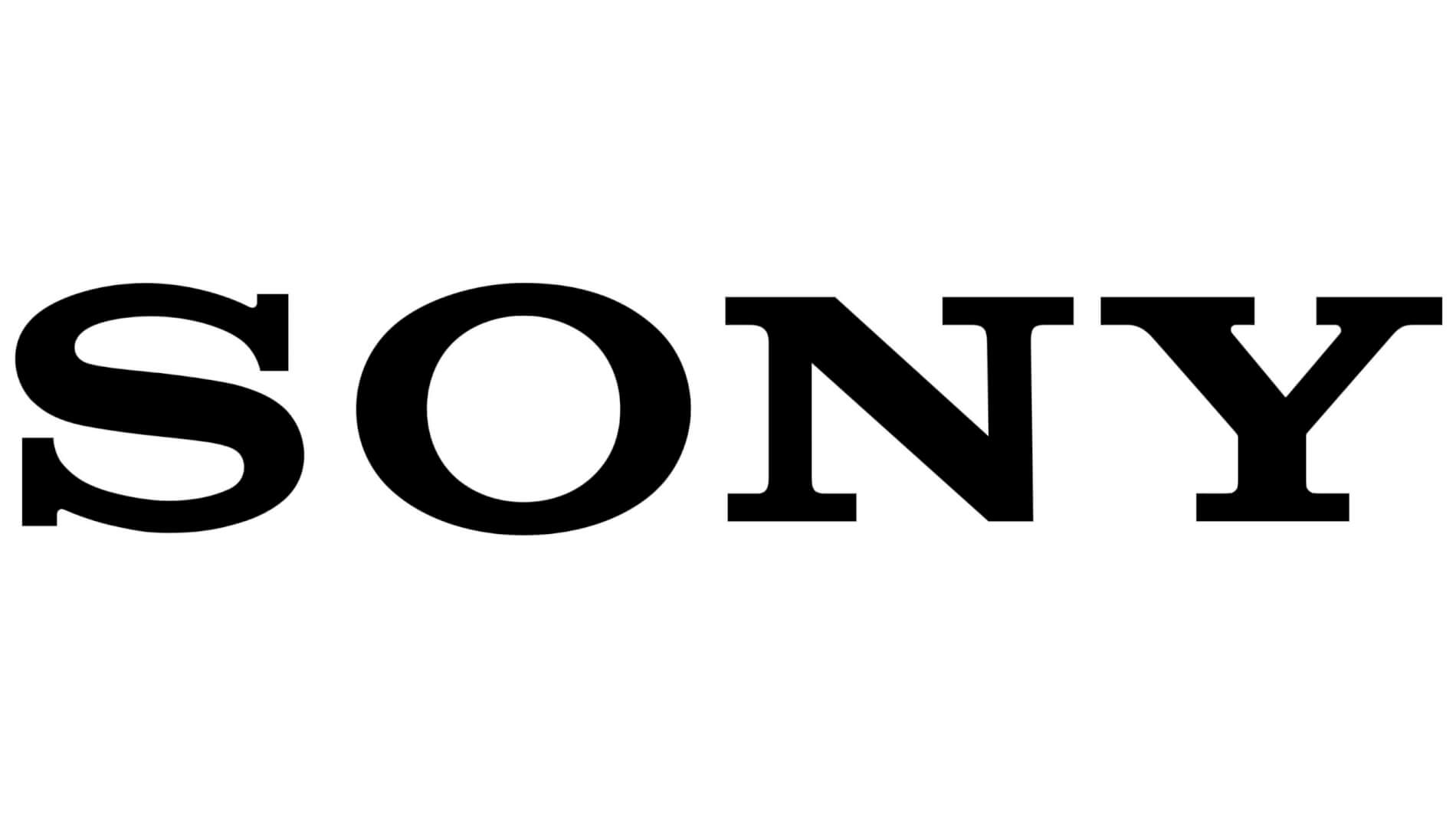
Film Skills
High-level cinematography
Directing
Production
Post production
Lighting
Sound
Visual effects skills
Course Structure
Stage 1: Foundations
Develop the essential technical film skills and the knowledge required to collaborate with other creative media students and professionals.
Credit Points: 10
This unit aims to instil a basic working knowledge of the structures, aesthetics and technologies involved in digital post-production. There is a particular emphasis on the editing process, as well as a general introduction to audio mixing, titling, colour grading and authoring processes within an industry-level non-linear editing tool.
Editing techniques and approaches vary between different mediums and this unit focuses on both documentary and drama workflows and file management protocols. Effective communication of narrative is the main focus of the unit, and you will learn to edit for narrative clarity, performance, subtext and dramatic effect. Historical and contemporary perspectives on montage theory and continuity editing theory will be explored to broaden your understanding and approach to the art of editing.
This unit aims to instil a basic working knowledge of the structures, aesthetics and technologies involved in digital post-production. There is a particular emphasis on the editing process, as well as a general introduction to audio mixing, titling, colour grading and authoring processes within an industry-level non-linear editing tool.
Editing techniques and approaches vary between different mediums and this unit focuses on both documentary and drama workflows and file management protocols. Effective communication of narrative is the main focus of the unit, and you will learn to edit for narrative clarity, performance, subtext and dramatic effect. Historical and contemporary perspectives on montage theory and continuity editing theory will be explored to broaden your understanding and approach to the art of editing.
Credit points: 10
You will be introduced to the theory and principles of storytelling across a range of contemporary creative media contexts, which will then be applied to the creation of storytelling documents appropriate to your discipline. Theoretical approaches to plot, structure, character, story world, theme and genre will be explored and applied to a range of story development tools to engage your audience. Feedback processes and reflection are essential in the development of engaging stories, and you are expected to document your process and feedback from your facilitator and peers.
You will be introduced to the theory and principles of storytelling across a range of contemporary creative media contexts, which will then be applied to the creation of storytelling documents appropriate to your discipline. Theoretical approaches to plot, structure, character, story world, theme and genre will be explored and applied to a range of story development tools to engage your audience. Feedback processes and reflection are essential in the development of engaging stories, and you are expected to document your process and feedback from your facilitator and peers.
Credit points: 10
You will be introduced to the craft of filmmaking through participation in practical film shoots. An introduction to camera, lighting and sound equipment will be supported by a study of the fundamentals of frame composition and cinematography. Key roles and responsibilities of a working film crew as well as production processes and protocols are covered, including workplace health and safety. Familiarity with the equipment and its safe assembly and use is as important in this subject as the technical and creative elements.
You will be introduced to the craft of filmmaking through participation in practical film shoots. An introduction to camera, lighting and sound equipment will be supported by a study of the fundamentals of frame composition and cinematography. Key roles and responsibilities of a working film crew as well as production processes and protocols are covered, including workplace health and safety. Familiarity with the equipment and its safe assembly and use is as important in this subject as the technical and creative elements.
Credit points: 10
This unit will introduce you to the mindset and skillset of the creative entrepreneur, and transform your approach to problem-solving. You will analyse historical and contemporary models of leadership and best practice in entrepreneurship, and use tools for project design that include ideation, problem framing, and pitching. The skills in this unit will assist you in developing your creative thinking, exploration, and experimentation methods, allowing you to experiment with project design and content for creative media.
This unit will introduce you to the mindset and skillset of the creative entrepreneur, and transform your approach to problem-solving. You will analyse historical and contemporary models of leadership and best practice in entrepreneurship, and use tools for project design that include ideation, problem framing, and pitching. The skills in this unit will assist you in developing your creative thinking, exploration, and experimentation methods, allowing you to experiment with project design and content for creative media.
Credit points: 10
In this unit, students will draw upon practical theories of screenwriting and engage in industry standard iterative practices to produce high quality screenplays for short film production. The unit will introduce strategies for concept development, provide students with the opportunity to refine supporting documentation such a synopsis, outline or treatment, and guide students in applying stylistic conventions and narrative theories to their story ideas. The unit focuses on communicating strong characters and story worlds on the page, and crafting effective dialogue and scenes that engage audiences emotionally. Screenwriting is a learned craft that requires discipline, perseverance and an understanding of industry practice. You will engage with professional feedback processes as you develop your story concepts through to script stage, and then a pitch deck and final draft script.
In this unit, students will draw upon practical theories of screenwriting and engage in industry standard iterative practices to produce high quality screenplays for short film production. The unit will introduce strategies for concept development, provide students with the opportunity to refine supporting documentation such a synopsis, outline or treatment, and guide students in applying stylistic conventions and narrative theories to their story ideas. The unit focuses on communicating strong characters and story worlds on the page, and crafting effective dialogue and scenes that engage audiences emotionally. Screenwriting is a learned craft that requires discipline, perseverance and an understanding of industry practice. You will engage with professional feedback processes as you develop your story concepts through to script stage, and then a pitch deck and final draft script.
Credit Points: 10
This unit introduces you to the fundamental principles of screen studies, including theory and history, to explore ways in which these principles are connected to screen practice. Emphasis is placed on how these concepts and approaches work within screen production, allowing you to develop analytical, critical reflection and creative thinking skills by applying your understanding of topics in project-based activities. Finally, this unit should assist you in becoming more critically aware of your craft and introduce you to ways of developing your knowledge of screen production.
This unit introduces you to the fundamental principles of screen studies, including theory and history, to explore ways in which these principles are connected to screen practice. Emphasis is placed on how these concepts and approaches work within screen production, allowing you to develop analytical, critical reflection and creative thinking skills by applying your understanding of topics in project-based activities. Finally, this unit should assist you in becoming more critically aware of your craft and introduce you to ways of developing your knowledge of screen production.
Credit points: 20
Cinematography II: Production will solidify and expand your knowledge in the areas of cinematography (camera & lighting) and also sound recording. The skills you learn in this unit can be applied to any form of film/TV production. In this unit you will shoot a studio-style interview and then either a short cinematic sequence, music video, or behind-the-scenes video for a short film.
You will learn to use prime lenses and follow-focus units, how to set exposure correctly using waveform monitoring and false colour functions, and be introduced to shooting in LOG format (flatter colour space) which allows for greater flexibility in colour grading. ND Filters, effective shot coverage and framing techniques will be explored in greater detail. Lighting fixtures will be utilised in a variety of studio shooting scenarios, including interview settings, day/night interiors for drama scenes, and green screen sequences. Additionally, lighting contrast ratios and genre styles will be explored. You will also learn how to use external audio recorders/mixers, and delve more into microphone choices and effective placement.
Cinematography II: Production will solidify and expand your knowledge in the areas of cinematography (camera & lighting) and also sound recording. The skills you learn in this unit can be applied to any form of film/TV production. In this unit you will shoot a studio-style interview and then either a short cinematic sequence, music video, or behind-the-scenes video for a short film.
You will learn to use prime lenses and follow-focus units, how to set exposure correctly using waveform monitoring and false colour functions, and be introduced to shooting in LOG format (flatter colour space) which allows for greater flexibility in colour grading. ND Filters, effective shot coverage and framing techniques will be explored in greater detail. Lighting fixtures will be utilised in a variety of studio shooting scenarios, including interview settings, day/night interiors for drama scenes, and green screen sequences. Additionally, lighting contrast ratios and genre styles will be explored. You will also learn how to use external audio recorders/mixers, and delve more into microphone choices and effective placement.
Stage 2: Refine & Expand
Broaden your scope to work on complex multidisciplinary projects in accordance with industry-standard practices.
Credit Points: 10
In this unit, you will collaborate on interdisciplinary projects that blend creativity and technology across fields such as film, audio, music, gaming, design, and computer science. Through project-based learning, you'll explore how different disciplines contribute to innovative outcomes—like immersive installations or interactive experiences. The unit focuses on strengthening communication, problem-solving, and teamwork across creative and technical areas. You'll be challenged to apply your existing skills while embracing new perspectives and ways of working, developing a holistic understanding of contemporary media production and preparing you to deliver complex, boundary-pushing creative solutions.
In this unit, you will collaborate on interdisciplinary projects that blend creativity and technology across fields such as film, audio, music, gaming, design, and computer science. Through project-based learning, you'll explore how different disciplines contribute to innovative outcomes—like immersive installations or interactive experiences. The unit focuses on strengthening communication, problem-solving, and teamwork across creative and technical areas. You'll be challenged to apply your existing skills while embracing new perspectives and ways of working, developing a holistic understanding of contemporary media production and preparing you to deliver complex, boundary-pushing creative solutions.
Credit Points: 20
In this unit, you will step into the dynamic world of filmmaking, mirroring industry processes from conception to distribution. Through hands-on experience, you will navigate the stages of development, pre-production, principal photography, post-production, and distribution. Emphasising a real-world approach, you will collaborate on creating a short film, honing your skills in creative leadership and teamwork as you specialise in a critical production role. FLM216 fosters a holistic understanding of the filmmaking craft and prepares you for the challenges and opportunities in the landscape of the industry.
In this unit, you will step into the dynamic world of filmmaking, mirroring industry processes from conception to distribution. Through hands-on experience, you will navigate the stages of development, pre-production, principal photography, post-production, and distribution. Emphasising a real-world approach, you will collaborate on creating a short film, honing your skills in creative leadership and teamwork as you specialise in a critical production role. FLM216 fosters a holistic understanding of the filmmaking craft and prepares you for the challenges and opportunities in the landscape of the industry.
Credit points: 10
In this unit, students will strengthen and consolidate their emerging filmmaking skills through the application of industry standard directing and producing techniques. The unit will introduce key principles of scene analysis and directing for students to produce a short showreel scene, and guide students to the best praxical application of directing and producing protocols. The unit focuses on the essential collaboration of directors and producers to work together to deliver high-quality, on-screen outcomes such as complex and realistic actor performances, and a shared creative vision. Understanding the roles of the director and producer and the need to support each other in a collaborative group to realise the best possible on-screen outcomes is an essential part of professional filmmaking, and will establish and hone transferable skills necessary for your work at SAE and beyond.
In this unit, students will strengthen and consolidate their emerging filmmaking skills through the application of industry standard directing and producing techniques. The unit will introduce key principles of scene analysis and directing for students to produce a short showreel scene, and guide students to the best praxical application of directing and producing protocols. The unit focuses on the essential collaboration of directors and producers to work together to deliver high-quality, on-screen outcomes such as complex and realistic actor performances, and a shared creative vision. Understanding the roles of the director and producer and the need to support each other in a collaborative group to realise the best possible on-screen outcomes is an essential part of professional filmmaking, and will establish and hone transferable skills necessary for your work at SAE and beyond.
Credit Points: 20
This unit offers a deep dive into the art and craft of documentary filmmaking. Through a series of hands-on workshops, insightful lectures, and practical exercises, participants will learn the fundamental principles of storytelling, cinematography, sound design, and editing specific to the documentary genre. From conceptualization to production and post-production, students will explore the ethical considerations, creative techniques, and technical skills essential for creating impactful and authentic documentaries. Drawing inspiration from a diverse range of documentary styles and filmmakers, participants will have the opportunity to develop their unique voice and vision while gaining practical experience in crafting compelling narratives that resonate with audiences.
This unit offers a deep dive into the art and craft of documentary filmmaking. Through a series of hands-on workshops, insightful lectures, and practical exercises, participants will learn the fundamental principles of storytelling, cinematography, sound design, and editing specific to the documentary genre. From conceptualization to production and post-production, students will explore the ethical considerations, creative techniques, and technical skills essential for creating impactful and authentic documentaries. Drawing inspiration from a diverse range of documentary styles and filmmakers, participants will have the opportunity to develop their unique voice and vision while gaining practical experience in crafting compelling narratives that resonate with audiences.
Credit Points: 10
This unit seeks to deepen an understanding and proficiency in advanced techniques. It delves into sophisticated methodologies across color grading, visual effects, sound design, and advanced editing. Through rigorous exploration and practical application, students will gain insight into the complexities of post-production workflows and refine their technical skills. Emphasizing critical analysis and practical exercises, this academic unit provides a platform for participants to engage in scholarly discourse, collaborative learning, and hands-on experimentation. By interrogating theoretical frameworks and industry practices, participants will develop a nuanced understanding of film post-production and enhance their ability to produce compelling cinematic works.
This unit seeks to deepen an understanding and proficiency in advanced techniques. It delves into sophisticated methodologies across color grading, visual effects, sound design, and advanced editing. Through rigorous exploration and practical application, students will gain insight into the complexities of post-production workflows and refine their technical skills. Emphasizing critical analysis and practical exercises, this academic unit provides a platform for participants to engage in scholarly discourse, collaborative learning, and hands-on experimentation. By interrogating theoretical frameworks and industry practices, participants will develop a nuanced understanding of film post-production and enhance their ability to produce compelling cinematic works.
Credit Points: 10
Media and culture are not simply entertainment, but something that affects the “real world”, our everyday lives, and our worldviews. As such, we will not ask whether media accurately reflect the real world but instead ask how media shape, reinforce, and challenge power structures that influence our understanding of the world and ourselves. This unit takes a ‘critical theory’ approach to analyze media and culture. In this unit, you will explore media texts, contexts and meaning, society and subjectivity, pop culture aesthetics, and critical cultural discourses that inform creative media practices.
Drawing on a range of creative content and analytical frameworks, you will be encouraged to develop ways of thinking about media and culture that demonstrate a broad awareness of aesthetic principles and stylistic trends; subjectivity, agency, ethics, and relations of power; contexts, disciplines and discursive formations. In support of this exploration, you will produce a range of media artifacts that explore and contextualize the relationship of media to culture through individual analysis, collaborative and interdisciplinary creative practice, and critical reflection.
Media and culture are not simply entertainment, but something that affects the “real world”, our everyday lives, and our worldviews. As such, we will not ask whether media accurately reflect the real world but instead ask how media shape, reinforce, and challenge power structures that influence our understanding of the world and ourselves. This unit takes a ‘critical theory’ approach to analyze media and culture. In this unit, you will explore media texts, contexts and meaning, society and subjectivity, pop culture aesthetics, and critical cultural discourses that inform creative media practices.
Drawing on a range of creative content and analytical frameworks, you will be encouraged to develop ways of thinking about media and culture that demonstrate a broad awareness of aesthetic principles and stylistic trends; subjectivity, agency, ethics, and relations of power; contexts, disciplines and discursive formations. In support of this exploration, you will produce a range of media artifacts that explore and contextualize the relationship of media to culture through individual analysis, collaborative and interdisciplinary creative practice, and critical reflection.
Stage 3: Showcase
Execute a project of your own design which is of a high quality and externally published, with the knowledge to commercialise if you choose. You'll also apply your skills through industry work placement.
Credit Point: 20
Through a combination of theoretical examination and practical application, this unit provides students with the foundational knowledge and skills necessary to excel in client-driven film production environments. Students will explore key concepts such as client communication, project management, budgeting, and delivery expectations within the context of filmmaking. Through case studies and hands-on exercises, participants will develop strategies for meeting client objectives while maintaining artistic integrity and creative vision. Emphasizing collaboration, problem-solving, and adaptability, this unit equips participants with the tools and techniques needed to navigate the dynamic landscape of client-based film production successfully.
Through a combination of theoretical examination and practical application, this unit provides students with the foundational knowledge and skills necessary to excel in client-driven film production environments. Students will explore key concepts such as client communication, project management, budgeting, and delivery expectations within the context of filmmaking. Through case studies and hands-on exercises, participants will develop strategies for meeting client objectives while maintaining artistic integrity and creative vision. Emphasizing collaboration, problem-solving, and adaptability, this unit equips participants with the tools and techniques needed to navigate the dynamic landscape of client-based film production successfully.
Credit Points: 10
Major Project Development forms the first component of your Capstone Project. In this unit you will work to conceptualise, plan, design and iterate the development, pre-production and early production stages of a full scale creative project. This will be assessed by two projects: a research component and a production planning component. Together, both of these documents will inform the basis for your CIM330 project, and will identify key moments of production, testing and operative cycles designed to help make your creative project a success.
Your class facilitator will work with you to control and guide the scope of your project. This process ensures that by the end of CIM330 Major Project Production you will have a portfolio piece that represents the sum total of your skills and experience, delivered on time and to specification.
As stage 3 students, it is expected that you are at a level where you can synthesise your reflective practice with your discipline and research work. Therefore, there is no CLO1 or learning journal for this unit. Instead you will deliver appendices to projects 1 and 2, which contain examples of your practice that demonstrate the research and planning that you have undertaken.
This does not mean you do not record your pre-class work or maintain a learning journal for your own purposes - rather it is assumed you are using the pre-class and in class activities as tools to enrich your project development and are applying the various lenses and concepts.
Major Project Development forms the first component of your Capstone Project. In this unit you will work to conceptualise, plan, design and iterate the development, pre-production and early production stages of a full scale creative project. This will be assessed by two projects: a research component and a production planning component. Together, both of these documents will inform the basis for your CIM330 project, and will identify key moments of production, testing and operative cycles designed to help make your creative project a success.
Your class facilitator will work with you to control and guide the scope of your project. This process ensures that by the end of CIM330 Major Project Production you will have a portfolio piece that represents the sum total of your skills and experience, delivered on time and to specification.
As stage 3 students, it is expected that you are at a level where you can synthesise your reflective practice with your discipline and research work. Therefore, there is no CLO1 or learning journal for this unit. Instead you will deliver appendices to projects 1 and 2, which contain examples of your practice that demonstrate the research and planning that you have undertaken.
This does not mean you do not record your pre-class work or maintain a learning journal for your own purposes - rather it is assumed you are using the pre-class and in class activities as tools to enrich your project development and are applying the various lenses and concepts.
Credit Points: 10
Developing your personal and professional practice is an essential part of the creative media practitioner’s skill set. Identifying knowledge areas and skill sets you may need to improve upon for your personal and professional development, then developing an action plan for improvement, are learned skills that a creative practitioner can leverage to continually build upon their goals.
In this unit, through a study of goal setting, SMART goals, and PIMRI improvement processes, you will plan and implement a personal project to develop skill or knowledge in an area of choice for improvement under the tutelage of a mentor. Student and facilitator feedback sessions will help you finesse your project, and exemplars of great goal setting from industry professionals will be used to guide your exploration. Through the completion of this unit, you will develop a practice that can aid you in your personal and professional life.
Developing your personal and professional practice is an essential part of the creative media practitioner’s skill set. Identifying knowledge areas and skill sets you may need to improve upon for your personal and professional development, then developing an action plan for improvement, are learned skills that a creative practitioner can leverage to continually build upon their goals.
In this unit, through a study of goal setting, SMART goals, and PIMRI improvement processes, you will plan and implement a personal project to develop skill or knowledge in an area of choice for improvement under the tutelage of a mentor. Student and facilitator feedback sessions will help you finesse your project, and exemplars of great goal setting from industry professionals will be used to guide your exploration. Through the completion of this unit, you will develop a practice that can aid you in your personal and professional life.
Credit Points: 10
Future jobs will require workers to learn on the job; focus on relationships with people; have strong communication skills; use a range of transferable skills. Research consistently points to the benefits of students being prepared with documents that are required for job applications, such as a Resume, Cover Letter, and E-portfolio.
In addition, the value of a Work Placement which provides you with professional experience and an opportunity to use skills and knowledge gained from study to complement this.
The Work Placement for SAE Bachelor students requires a minimum of 80 hours at one or more host organisation. Both the student and the host are required to complete an SAE Agreement which formalises the placement.
Future jobs will require workers to learn on the job; focus on relationships with people; have strong communication skills; use a range of transferable skills. Research consistently points to the benefits of students being prepared with documents that are required for job applications, such as a Resume, Cover Letter, and E-portfolio.
In addition, the value of a Work Placement which provides you with professional experience and an opportunity to use skills and knowledge gained from study to complement this.
The Work Placement for SAE Bachelor students requires a minimum of 80 hours at one or more host organisation. Both the student and the host are required to complete an SAE Agreement which formalises the placement.
Credit Points: 10
Gain an introduction to the principles of entrepreneurship to create and operate your own creative media small business venture. Through analysing the global media landscape, You'll be able to identify and explore start-up opportunities within the creative industries.
This unit is designed to be done in parallel with your capstone project. You'll apply the skills and knowledge from this unit to formulate a rigorous business case to help you commercialise your capstone project and use it as a basis for a creative media start-up.
Gain an introduction to the principles of entrepreneurship to create and operate your own creative media small business venture. Through analysing the global media landscape, You'll be able to identify and explore start-up opportunities within the creative industries.
This unit is designed to be done in parallel with your capstone project. You'll apply the skills and knowledge from this unit to formulate a rigorous business case to help you commercialise your capstone project and use it as a basis for a creative media start-up.
Credit Points: 20
Using the project plan and pre-production work that you completed in the Major Project Development Unit, you'll adopt a quality framework that will lead to the publication of a final creative piece.
This quality process will be accountable to multiple, external stakeholders and will test your ability to problem solve, evaluate and synthesise information to the standard that we expect from all SAE graduates. Throughout this journey, you will interact with your classmates and other key stakeholders using the processes and systems and that you would have developed throughout your course.
The publication and subsequent success of the final deliverable will represent the broadening and deepening of your professional practice which has occurred during your journey.
Using the project plan and pre-production work that you completed in the Major Project Development Unit, you'll adopt a quality framework that will lead to the publication of a final creative piece.
This quality process will be accountable to multiple, external stakeholders and will test your ability to problem solve, evaluate and synthesise information to the standard that we expect from all SAE graduates. Throughout this journey, you will interact with your classmates and other key stakeholders using the processes and systems and that you would have developed throughout your course.
The publication and subsequent success of the final deliverable will represent the broadening and deepening of your professional practice which has occurred during your journey.
Credit Points: 10
CRICOS Course Codes
PRODUCTION: FF7F4
062747K (8 TRIMESTERS)
Australian Qualifications Framework
AQF Level: 7
FULLY ACCREDITED BY TEQSA
We consult closely with industry professionals so you can expect a course that’s highly relevant and equips you with sought after skills.



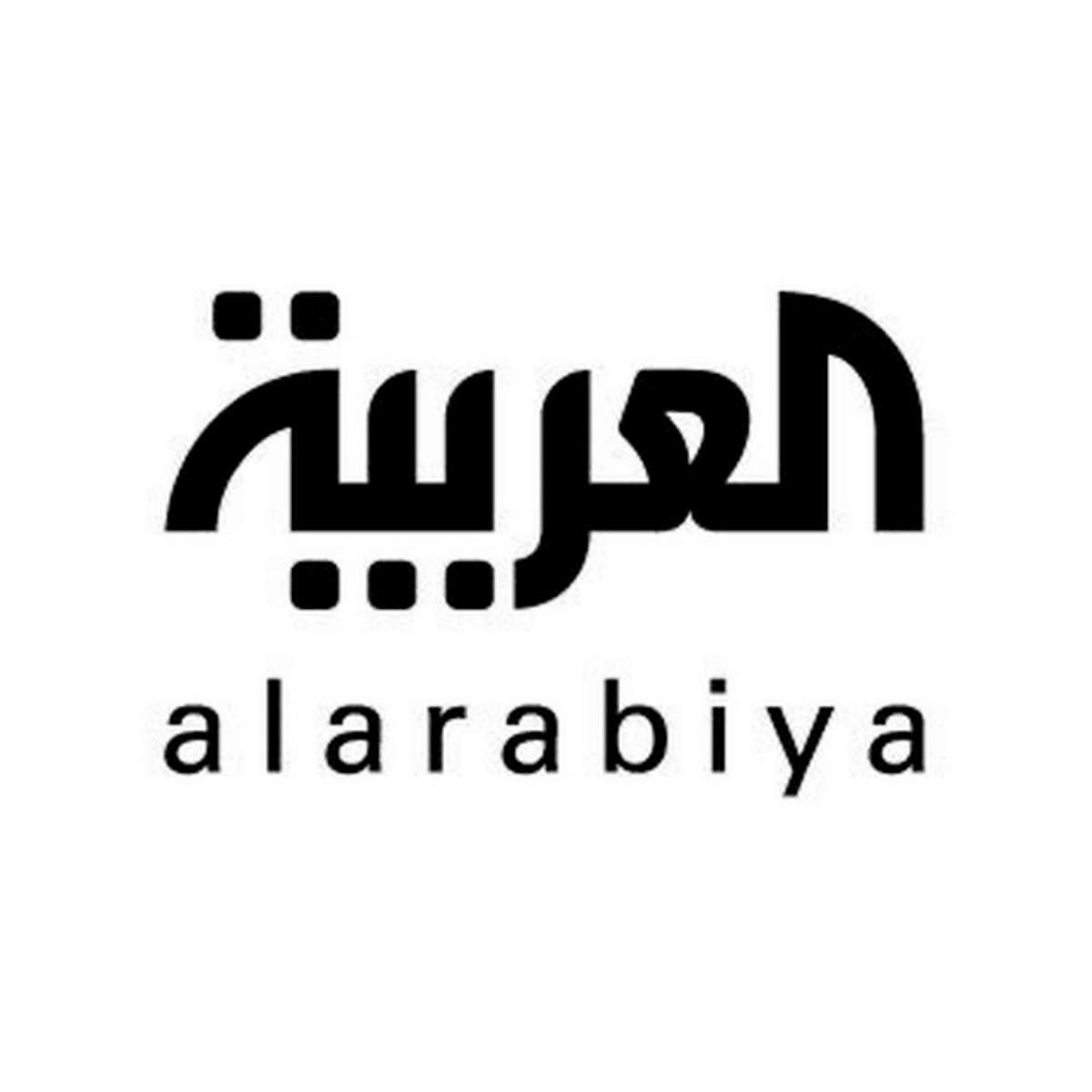





Career Outcomes
What jobs will this course lead to?
- Director
- Producer
- Screenwriter / Scriptwriter
- Cinematographer / Director of Photography
- Editor / Post-Production Specialist
- Camera Operator
- Lighting Technician / Gaffer
- Production Designer / Art Director
- Content Creator / YouTuber / Social Media Video Producer
- Film Critic / Journalist
- Commercial / Corporate video producer
- Independent filmmaker
